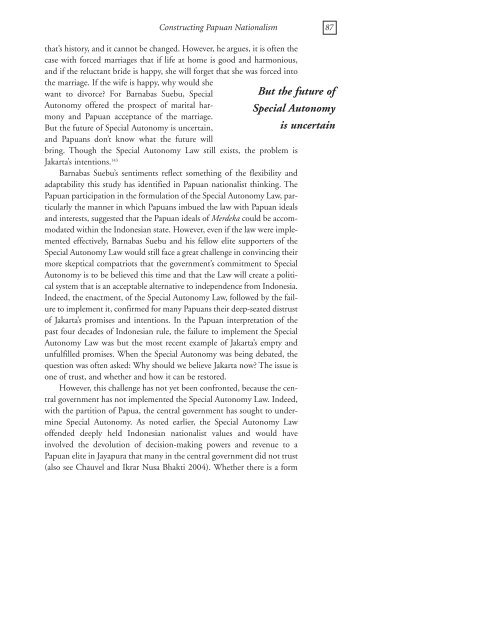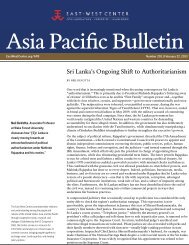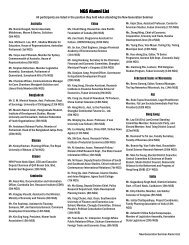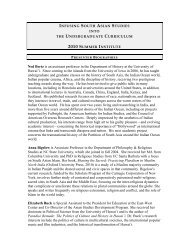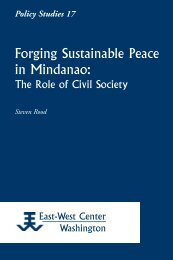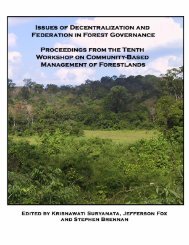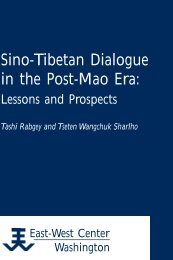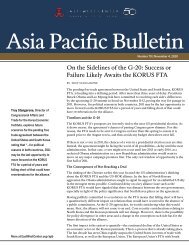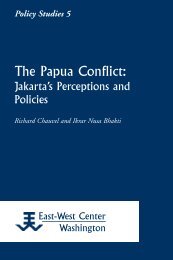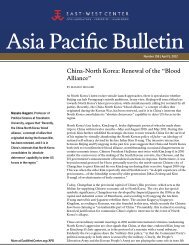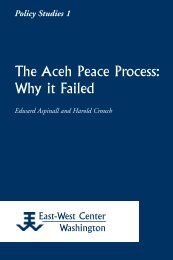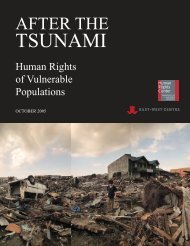Constructing Papuan Nationalism: History, Ethnicity ... - ScholarSpace
Constructing Papuan Nationalism: History, Ethnicity ... - ScholarSpace
Constructing Papuan Nationalism: History, Ethnicity ... - ScholarSpace
- No tags were found...
Create successful ePaper yourself
Turn your PDF publications into a flip-book with our unique Google optimized e-Paper software.
<strong>Constructing</strong> <strong>Papuan</strong> <strong>Nationalism</strong> 87that’s history, and it cannot be changed. However, he argues, it is often thecase with forced marriages that if life at home is good and harmonious,and if the reluctant bride is happy, she will forget that she was forced intothe marriage. If the wife is happy, why would shewant to divorce? For Barnabas Suebu, SpecialAutonomy offered the prospect of marital harmonyand <strong>Papuan</strong> acceptance of the marriage.But the future of Special Autonomy is uncertain,and <strong>Papuan</strong>s don’t know what the future willbring. Though the Special Autonomy Law still exists, the problem isJakarta’s intentions. 143Barnabas Suebu’s sentiments reflect something of the flexibility andadaptability this study has identified in <strong>Papuan</strong> nationalist thinking. The<strong>Papuan</strong> participation in the formulation of the Special Autonomy Law, particularlythe manner in which <strong>Papuan</strong>s imbued the law with <strong>Papuan</strong> idealsand interests, suggested that the <strong>Papuan</strong> ideals of Merdeka could be accommodatedwithin the Indonesian state. However, even if the law were implementedeffectively, Barnabas Suebu and his fellow elite supporters of theSpecial Autonomy Law would still face a great challenge in convincing theirmore skeptical compatriots that the government’s commitment to SpecialAutonomy is to be believed this time and that the Law will create a politicalsystem that is an acceptable alternative to independence from Indonesia.Indeed, the enactment, of the Special Autonomy Law, followed by the failureto implement it, confirmed for many <strong>Papuan</strong>s their deep-seated distrustof Jakarta’s promises and intentions. In the <strong>Papuan</strong> interpretation of thepast four decades of Indonesian rule, the failure to implement the SpecialAutonomy Law was but the most recent example of Jakarta’s empty andunfulfilled promises. When the Special Autonomy was being debated, thequestion was often asked: Why should we believe Jakarta now? The issue isone of trust, and whether and how it can be restored.However, this challenge has not yet been confronted, because the centralgovernment has not implemented the Special Autonomy Law. Indeed,with the partition of Papua, the central government has sought to undermineSpecial Autonomy. As noted earlier, the Special Autonomy Lawoffended deeply held Indonesian nationalist values and would haveinvolved the devolution of decision-making powers and revenue to a<strong>Papuan</strong> elite in Jayapura that many in the central government did not trust(also see Chauvel and Ikrar Nusa Bhakti 2004). Whether there is a formBut the future ofSpecial Autonomyis uncertain


